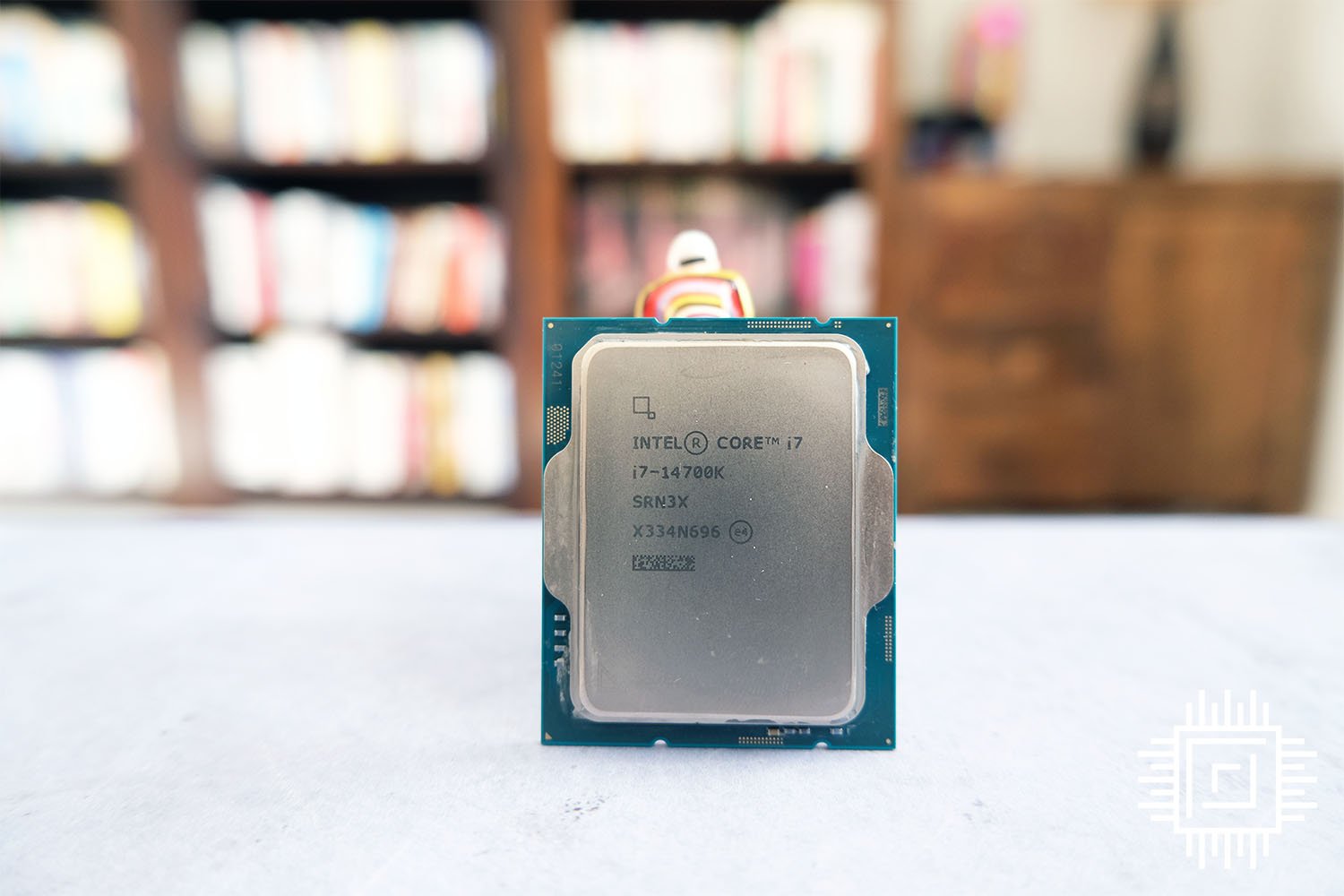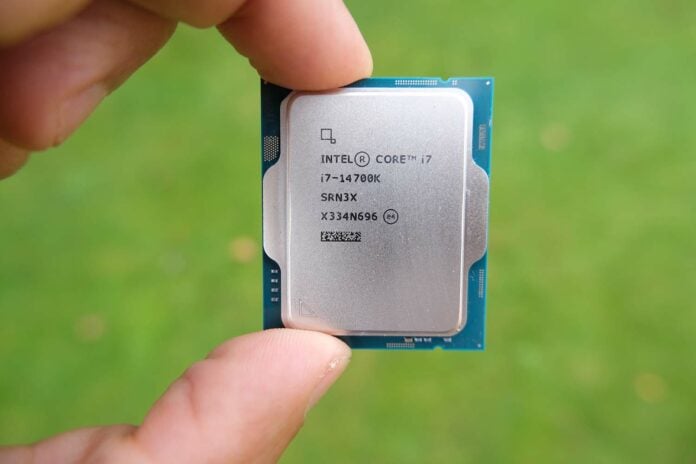Bursting on to the scene last month, Intel’s 14th Gen Core desktop launch represents a small evolution rather than revolution. Understandable, really, as the underlying architecture is identical to the 13th Gen Core range launched a year ago. Intel accomplishes advancement by massaging frequencies across various models to offer a bit more performance, but by and large, it’s not a release to remember. The one shining light is Core i7-14700K(F), equipped with four more Efficient cores this generation. A good question to ask is whether there’s enough improvement over the Intel Core i7-13700K to warrant serious consideration when compared to high-quality competition in the market today.


Intel Core i7-14700K
£400 / $419
Pros
- Great MT performance
- Best chip for around £400
- Uplift over previous gen
- Unlocked
- Faster than Ryzen 9 7900X
Cons
- High power usage
- No CPU cooler in box
Club386 may earn an affiliate commission when you purchase products through links on our site.
How we test and review products.
A look back through four generations sheds light on incremental changes. Intel uses Core i7 as fertile ground for adding more cores and threads through iterations, and now with 14700K, we see clear evidence of further E-Cores alongside greater levels of on-chip cache and higher peak speeds. All good stuff.
In fact, 14700K beats out two-year-old 12900K in the core-and-thread department. Recall, if you will, that headline chip carries 8P and 8E cores. Pure specifications suggest the latest chief Core i7 processor also nips at the heels of powerhouse 8P+16E-core 13900K, making this brand-new offering a great prospect on paper.
How it Compares
| CPU | Cores | Threads | L2 | L3 | Turbo | Max TDP | Release | MSRP |
|---|---|---|---|---|---|---|---|---|
| Core i7-14700K | 20 (8P+12E) | 28 | 28MB | 33MB | 5.6GHz | 253W | 10/23 | $419 |
| Core i7-13700K | 16 (8P+8E) | 24 | 24MB | 30MB | 5.4GHz | 253W | 10/22 | $419 |
| Core i7-12700K | 12 (8P+4E) | 20 | 12MB | 25MB | 5.0GHz | 190W | 11/21 | $459 |
| Core i7-11700K | 8 | 16 | 4MB | 16MB | 5.0GHz | 125W | 03/21 | $449 |
Sweetening the deal in days of lingering inflation, Intel keeps pricing at the same $419 / £400 as 13700K, so one can successfully argue that in real terms this CPU is actually cheaper than its direct predecessor.
Using the LGA 1700 socket common on both 12th and 13th Gen Core, there’s a whole heap of motherboard support through 600- and 700-series generations. Appreciating the 253W maximum power, we recommend that you invest in a premium board and cooling to get the most out of 14700K. A mid-priced Zx90 ought to do the trick nicely.
Primed to excel in multi-thread applications and gaming in equal measure, we’re looking for superlative all-round performance by specifically pitting Core i7-14700K against Core i7-13700K and price-comparable 12-core, 24-thread AMD Ryzen 9 7900X. Here, we’ll determine which £400 processor is the best CPU for builds both today and tomorrow.
Intel CPUs are tested on the ASRock Z790 Nova WiFi motherboard and Ryzen on the ASRock X670E Taichi. Both setups are updated to the latest BIOS and run with manufacturer-recommended wattages of 253W and 170W, respectively. Common components include Noctua NH-D15 chromax.black cooling, 32GB (2x16GB) Kingston Fury Beast RGB memory running at DDR5-5600, a 2TB Samsung 990 Pro SSD, and Zotac GeForce RTX 4090 (545.84 drivers). Let the rumble begin.
Performance
| Core i7-14700K | Core i7-13700K | AMD Ryzen 9 7900X | |
|---|---|---|---|
| Cores / threads | 20 / 28 | 16 / 24 | 12 / 24 |
| Current price | 406 pounds | 377 pounds | 385 pounds |
| Cinebench R23 1T | 2,169 marks | 2,057 marks | 2,028 marks |
| Cinebench R23 MT | 34,655 marks | 30,565 marks | 28,511 marks |
| Geekbench 5 1T | 2,160 marks | 2,044 marks | 2,245 marks |
| Geekbench 5 MT | 23,114 marks | 20,875 marks | 19,349 marks |
| Keyshot 11 MT | 5.38 marks | 5.03 marks | 4.23 marks |
| AIDA Read | 84,409 MB/s | 84,221 MB/s | 66,361 MB/s |
| AIDA Write | 79,032 MB/s | 79,060 MB/s | 78,339 MB/s |
| AIDA Latency | 69.9ns | 70.4 ns | 75.7 ns |
| 7-zip 19.00 | 171,432 MIPS | 157,712 MIPS | 170,613 MIPS |
| Blender 3.3.0 | 487.9 samples | 454.8 samples | 462.2 samples |
| V-Ray 5.0.20 | 23,618 samples | 21,430 samples | 22,003 samples |
| y-cruncher 9524 | 137.2 seconds | 148.1 seconds | 138.5 seconds |
| PCMark 10 | 9,792 score | 9,638 score | 9,412 score |
| 3DMark Time Spy | 32,547 | 31,270 | 29,358 |
| FF: Endwalker FHD | 315 fps | 303 fps | 294 fps |
| AC Valhalla FHD | 213 fps | 211 fps | 211 fps |
| Cyberpunk 2077 FHD | 125 fps | 125 fps | 124 fps |
| Far Cry 6 FHD | 144 fps | 140 fps | 130 fps |
| Forza Horizon 5 FHD | 210 fps | 208 fps | 208 fps |
| TC: R6E FHD | 460 fps | 454 fps | 434 fps |
| Power Consumption | 337 watts | 330 watts | 268 watts |
| Club386 Efficiency | 102.83 marks | 92.62 marks | 106.38 marks |
| Club386 Value | 85.36 marks | 81.07 marks | 74.05 marks |
Intel and AMD go about business with different approaches. Team Core relies on a hybrid architecture which integrates performance and efficiency cores into one package. Team Ryzen, on the other hand, uses a symmetrical design composed of Zen 4 muscle.
Operating north of 5GHz when Performance cores are locked and loaded, i7-14700K is understandably speedier than its direct predecessor, to the tune of around 10 per cent in multi-threaded tests. An extra four Efficient cores naturally elevate benchmark numbers, and there’s enough under the hood to eke out a small fps lead when gaming on powerful GeForce RTX 4090.
Looking over to Ryzen territory, it’s actually a close-run thing, because while i7-14700K comes up trumps more often than not, the performance gap is relatively small in most instances.
Nevertheless, winning 19 out of 23 benchmarks in this three-CPU comparo illustrates Intel’s made a wise decision in enhancing the firepower contained within 14700K. Solid results call into question investment in dearer processors, actually, and we’d be happy with Core i7’s finest for both content creation and gaming. Both efficiency (surprisingly) and value are strong for this chip, too, indicating Intel has both metrics bang on.
The only blot on the copybook is a wattage demand manifestly higher than AMD’s Ryzen 9. Pulling an extra 69W at the wall for the multi-core applications, most mid-range air coolers simply don’t have the necessary chops to deal with the 253W beast, so it’s worth considering a top-notch solution from the likes of be quiet! and Noctua or, better still, liquid cooling from a raft of capable 280 / 360 AIOs.
Conclusion
The Intel Core i7-14700K is the most interesting processor from the 14th Gen Core family. Following traditional laid down by the last generation, an extra four E-Cores make a small but important difference in benchmark performance. It’s now bold enough to enable i7’s best to pull away from price-comparable Ryzen 9 and last-generation 13700K.
Providing best-in-class gaming for an all-round chip, there’s plenty to like, and we recommend it to anyone contemplating a well-balanced £1,500 PC this winter.
Verdict: The best desktop Core i7 chip to date is a formidable performer.

